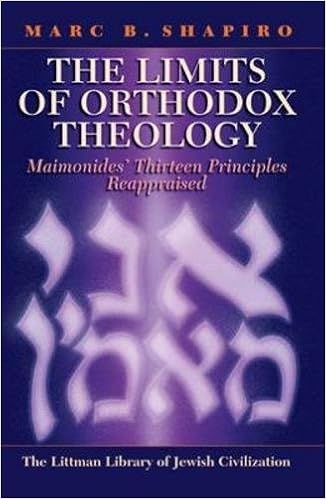 Anyway, Rabbi Grossman is now in the public eye for writing a hatchet-job (it can't really be called a critique) on Dr. Marc Shapiro's famous book The Limits of Orthodox Theology: Maimonides' Thirteen Principles Reappraised. This was published in the charedi polemical journal ironically called Dialogue, founded by Rav Feldman and Rabbi Moshe Meiselman. Dr. Shapiro has responded with an excellent take-down of Rabbi Grossman's article, in which he demonstrates how Rabbi Grossman displayed some disturbing shortcomings in ethical behavior (he corresponded with Dr. Shapiro under the pretext of asking him questions about an article that he was writing on the Ikkarim!), as well as completely distorting the purpose and content of Dr. Shapiro's book.
Anyway, Rabbi Grossman is now in the public eye for writing a hatchet-job (it can't really be called a critique) on Dr. Marc Shapiro's famous book The Limits of Orthodox Theology: Maimonides' Thirteen Principles Reappraised. This was published in the charedi polemical journal ironically called Dialogue, founded by Rav Feldman and Rabbi Moshe Meiselman. Dr. Shapiro has responded with an excellent take-down of Rabbi Grossman's article, in which he demonstrates how Rabbi Grossman displayed some disturbing shortcomings in ethical behavior (he corresponded with Dr. Shapiro under the pretext of asking him questions about an article that he was writing on the Ikkarim!), as well as completely distorting the purpose and content of Dr. Shapiro's book.Of particular interest is how Rabbi Grossman accuses Dr. Shapiro of "mocking" several Rishonim and Acharonim. Dr. Shapiro, who was shocked at this accusation, goes through every example cited by Rabbi Grossman, and shows how in each case he was simply stating that which is obviously and clearly true.
For example, R. Grossman points to Dr. Shapiro writing that that Rabbeinu Nissim “puts forth the strange and original position that there is one particular angel before whom prostration is permitted.” Well, yes, that is indeed a strange and original position. And calling something "strange and original" (and worse!) has been done by many widely renowned Torah scholars about the writings of other, even more renowned Torah scholars. Likewise, in each of the cases that R. Grossman cites, there is no "mockery" at all.
So what is going on here? The answer is that when R. Grossman claims that something is "mockery," what he really means is "saying anything at all that lowers the prestige of the authority in question." Even when it is merely drawing attention to the obvious.
I've seen this phenomenon on countless occasions. I have been frequently told that my books "mocked" Chazal, by my pointing out that on three occasions Chazal repeated errant beliefs regarding zoology that were held by the greatest scientists of their era.
Why do these people describe such perfectly reasonable statements as "mockery"? One could suggest that it is because, in their eyes, great Torah scholars are, practically speaking, infallible and all-authoritative. Thus, anything which demonstrates otherwise is a blow to their honor; it is a short distance from that to describing it as "mockery."
But this answer is insufficient. Because the charge of "mockery" is often leveled even with regard to quoting Torah giants' own teachings, in cases where these are uncomfortable teachings that their sycophants would rather be excised from public memory. How on earth is that mockery?!
I think that the real answer as to why these people claim "mockery" is that they don't want to admit, even to themselves, that they are too weak to accept anything that even legitimately reduces the godlike status of their heroes - from which they drawn their own self-esteem. So they describe it as "mockery," in order for their accusation to appear to have merit, and for the other person to appear as the bad guy.
Of course, the innate hypocrisy in all this is that R. Grossman, and the Gedolei Torah that he reveres, end up degrading prestigious Rishonim and Acharonim in vastly worse ways than anything that Dr. Shapiro or myself have ever written. They effectively say that numerous Rishonim and Acharonim taught a view of Chazal that is so fundamentally perverted that it can be described as heretical and should be deleted from their history. Can there be any worse degradation of Torah scholars?!
(If you'd like to subscribe to this blog via email, use the form on the
right of the page, or send me an email and I will add you.)
.jpg)

